
National People's Congress deputies walk out of the Great Hall of the People, Beijing, March 11, 2024. [Photo/VCG]
As China prepares for the third session of the 14th National People's Congress in early March, the pivotal role of NPC deputies in addressing the nation's most pressing challenges remains at the forefront. Representing a diverse array of professions and backgrounds, these deputies have consistently worked to propose and advance solutions to a wide range of economic, social, and technological issues.
According to the NPC's Deputies Affairs Commission, a record 9,235 proposals were submitted during the 2024 NPC annual session, which were reviewed and processed by 213 agencies. These proposals have played a crucial role in shaping China's national policies, with collaboration between lawmakers and government departments leading to tangible policy changes aimed at fostering development across various sectors.
Deputies impact policy and industry
The NPC is the supreme organ of state power and the national legislature. It has the authority to amend the Constitution, pass laws, approve major policies, and oversee government actions. With nearly 3,000 NPC deputies at the national level and over 2.5 million at all levels of the people's congresses, they play a vital role in linking the government to the public.
Township-level and county-level deputies are directly elected by voters, while deputies at other levels are indirectly elected by respective lower-level people's congresses. There is a permanent body of NPC – Standing Committee of the National People's Congress. When the NPC concludes its annual session, the NPC Standing Committee will exercise its power. The system ensures that the will of the people is reflected in government's work.
A notable example is Huang Li, chairman of a high-tech company and an NPC deputy. During the second session of the 14th National People's Congress in 2024, Huang made a proposal highlighting the need to accelerate the development of brain-machine interface (BMI) technology, a field with immense potential for revolutionizing healthcare and human-computer interaction.
He called for the establishment of a national brain science and technology innovation center to bring together leading experts in neuroscience, engineering, and medicine to advance BMI research. Huang also advocated for national standards for clinical BMI applications and faster regulatory approvals for related medical devices. His proposal is part of a broader push within the tech industry, which has been calling for the acceleration of BMI technology and the establishment of China as a global leader in this emerging field in recent years.
In response to these efforts, the National Science and Technology Ethics Committee introduced the first-ever ethical guidelines for BMI research in February 2024. By mid-year, the Ministry of Industry and Information Technology began planning a BMI Standardization Technical Committee to develop regulatory and safety standards. Additionally, Beijing and Shanghai released five-year action plans for the BMI industry in January this year, signaling strong governmental support.
Ensuring legislative action on critical issues
The NPC's work is marked by collaboration and responsiveness. Unlike some parliamentary systems characterized by adversarial debates, China's NPC system emphasizes problem-solving and pragmatic decision-making. Deputies engage in extensive consultations with experts, local communities, and the public to draft well-informed proposals that address critical challenges.
While high-tech sectors have garnered significant attention from deputies like Huang, NPC proposals span a broad spectrum of issues, including social welfare, environmental protection, and economic development. With China's economy facing more domestic challenges and external pressure in recent years, NPC deputies are paying more attention on stimulating the economy, especially the private sector.
A prime example is the drafting and introduction of the Private Economy Promotion Law. Since 2023, NPC deputies, members of the Chinese People's Political Consultative Conference National Committee, the All-China Federation of Industry and Commerce, and other organizations have submitted proposals advocating for legislation to protect and promote the private sector. In response, relevant government departments accelerated feasibility studies.
In February 2023, the Ministry of Justice, the National Development and Reform Commission, and the NPC Standing Committee's Legislative Affairs Commission jointly organized a legislative symposium, which kick-started the drafting process. Currently, the draft law is set to undergo a second reading by the NPC Standing Committee and is expected to be adopted later this year.
As the NPC convenes in March, the role of deputies will remain essential in steering China toward solutions that address the most innovative and urgent challenges. Whether advancing technology, improving public welfare, or fostering a stronger economy, NPC deputies continue to drive government work, pushing forward policies that meet both current needs and future aspirations.